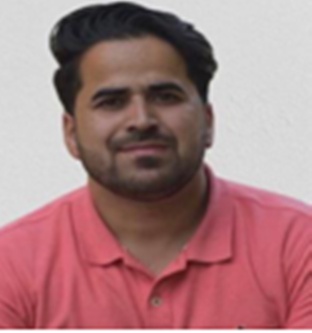 SRINAGAR: In a world where digital distractions often overshadow traditional reading, Ishfaq Manzoor has emerged as a passionate voice for knowledge and innovation in Kashmir. A distinguished writer, researcher, and Medical LIS professional, Ishfaq has devoted himself to strengthening the field of Library and Information Sciences while inspiring young minds to reconnect with the joy of reading.
SRINAGAR: In a world where digital distractions often overshadow traditional reading, Ishfaq Manzoor has emerged as a passionate voice for knowledge and innovation in Kashmir. A distinguished writer, researcher, and Medical LIS professional, Ishfaq has devoted himself to strengthening the field of Library and Information Sciences while inspiring young minds to reconnect with the joy of reading.
Currently serving at SKIMS MC, Ishfaq has introduced several forward-looking ideas in LIS. He is the author of multiple academic and motivational works, and the creator of concepts such as 'Zinda Kitab Ghar' (Living Library).
He has also consistently promoted the domestic library model, encouraging families and communities to establish reading spaces in their own homes. His hybrid vision for LISwhere digital access and print books complement each otherhas made him a respected name in contemporary circles.
Q & A with Ishfaq Manzoor
- Q: Ishfaq, you hold degrees in both Civil Engineering and LIS. What led you to choose Library and Information Sciences as your profession?
A: Engineering gave me technical problem-solving skills, but my passion for books and knowledge-sharing pulled me toward LIS. I realized that through this profession, I could serve students, doctors, researchers, and the community by creating meaningful access to information.
- Q: You often speak about the idea of a domestic library. What exactly do you mean by that?
A: The domestic library is about encouraging families to build small libraries at home. Even a modest collection of 50 to 100 books can create a lifelong impact. I have advised and motivated many people to set up such reading spaces, and I’m happy to say that several families have already established their own domestic libraries after being inspired by this idea.
- Q: What kind of change do you see when families adopt this model?
A: It nurtures reading habits naturally within the household. Children grow up surrounded by books, parents become more engaged in their children’s learning, and communities slowly shift toward valuing knowledge. It’s a simple but powerful way to build a reading culture from the ground up.
- Q: Your professional work focuses on Medical LIS. How do you view its role in today’s education and healthcare system?
A: Medical LIS is an integral support system for students, faculty, and healthcare professionals. It doesn’t just store resources but guides learning, supports research, and aids clinical decision-making. At SKIMS Medical College, I am working on blending digital access with traditional resources to create a balanced and user-friendly environment.
- Q: Could you explain your concept of Zinda Kitab Ghar for our readers?
A: Zinda Kitab Ghar, or 'Living Library,' is about making LIS spaces more interactive and dynamic. Instead of silent corners, I see them as vibrant hubs where books, discussions, and human experiences come together. It’s about keeping knowledge alive and relevant to people’s daily lives.
- Q: What are your views on social networking sites and their impact on students today?
A: Social networking sites have become an integral part of modern life, but I recently carried out a survey which showed that a majority of students are using multiple SNS platforms and spending a significant amount of time on them. While these platforms can facilitate communication and knowledge sharing, they can also be a distraction if not used mindfully. I advise students to balance their online engagement with reading and learning, and to consciously create time for academic and personal growth alongside social interactions.
- Q: You have written both academic and motivational works. What motivates your writing?
A: Writing is an extension of my profession. My academic works like 'A Comprehensive Book of LIS' and 'Library Cataloguing' are meant for LIS students and professionals, while books like 'Life: A Dream to Struggle for Zero' reflect my personal belief in resilience and moral values. I write to share knowledge and inspire reflection.
- Q: In your opinion, why should young people continue reading print books when digital platforms are so convenient?
A: Digital platforms are excellent for quick access and updates, but print books provide depth and focus. Reading a printed book builds patience, concentration, and a lasting connection with knowledge. I believe both formats should go hand in handdigital for speed, print for wisdom.
- Q: What is your vision for the future of LIS in Kashmir?
A: I envision LIS centers across J&K becoming modern, inclusive, and hybrid spaces where digital tools and printed books complement each other. I also hope to see more domestic libraries and community-driven initiatives so that reading becomes a way of life, not just an academic requirement.
- Q: If you could leave one message for the next generation of readers and Medical LIS professionals, what would it be?
A: I would tell them that knowledge is the most powerful tool we possess, but it is also a responsibility. Read not only to learn, but to think, to question, and to inspire others. Build spaceswhether at home, in institutions, or in communitieswhere curiosity thrives. A single book, a single idea, or a single motivated mind can create ripples that change society.
Through promoting domestic libraries, pioneering hybrid LIS initiatives, and authoring thought-provoking works, Ishfaq Manzoor has demonstrated how vision and passion can make knowledge accessible to all. His journey reminds us that bookswhether in print or digital formremain the strongest foundation for personal growth and community development.

